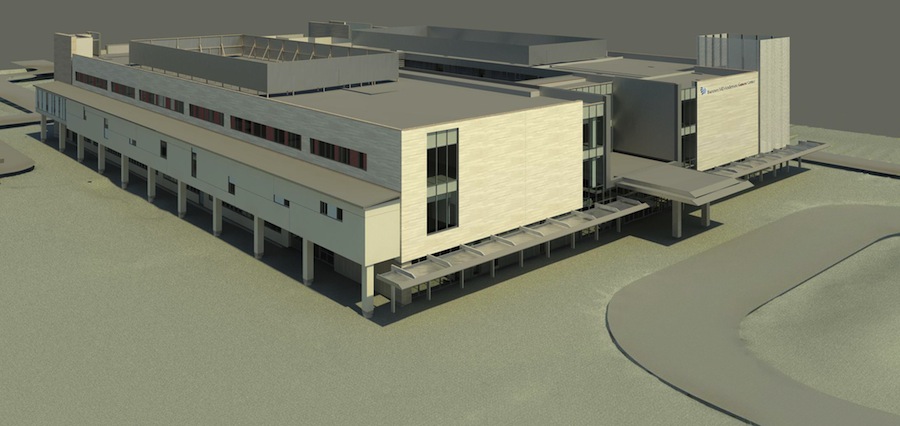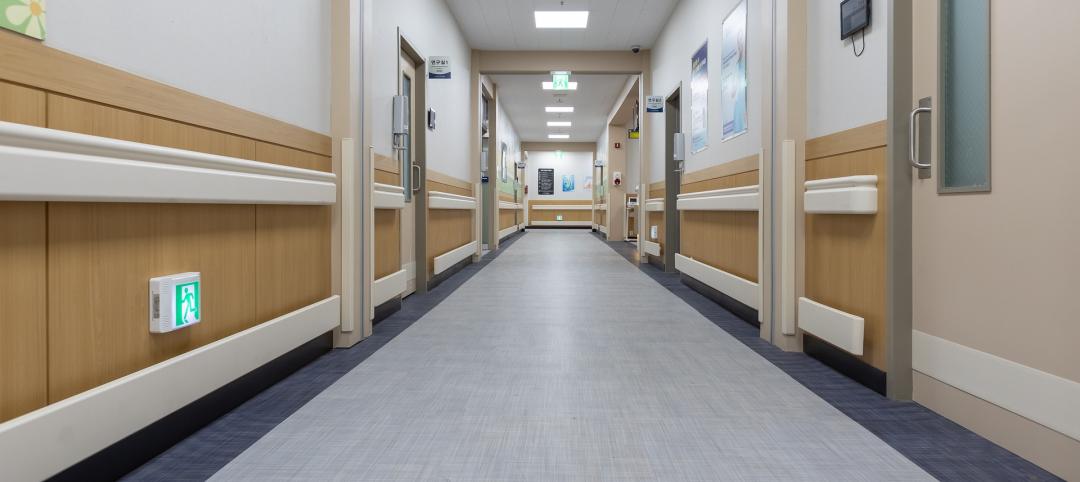Background
HKS, one of the top architectural firms practicing worldwide, specializes in healthcare, education, sports and hospitality design. The firm recently completed the design of phase two of the Banner Health MD Anderson Health Center in Gilbert, Arizona. This three-story, 110,000-square-foot facility provides additional space on the Banner Gateway Medical Center’s campus, which offers state-of-the-art, comprehensive cancer care. Banner Health selected HKS not only for their extensive experience in healthcare design, but also to work collaboratively with all project partners to digitize communication and deliver the facility using IPD.
Challenge
In order to meet the Owner’s IPD goals, HKS needed to digitize and streamline the flow of information to all team members. In the past, the firm had used a combination of solutions to electronically share and review drawings. However, the project’s General Contractor, DPR Construction, suggested the team use Bluebeam Studio throughout design, bid and build. Studio is the online collaboration feature of Revu, a PDF-based markup and collaboration solution that enables users to review large format drawings, redline them with customizable markups, track feedback and collaborate on PDFs with others in real time. Since HKS had already been using Revu’s PDF markup capabilities on other projects for over a year, it made sense to use Studio to host document-based collaboration sessions to foster greater collaboration among the entire project team.
Using Revu for IPD
Though HKS was no stranger to technology, using Revu enabled the firm to improve their workflows in several ways. Revu’s PDF markup technology, which includes customizable annotations such as text, highlights, pen marks, callouts, clouds, CAD symbols and measurements, took electronic commenting to the next level. In addition to providing the team with the ability to redline PDFs, Revu’s exclusive Tool Chest allowed users to save custom markups and easily standardize markup types, fonts and colors. The Markups list, which tracks every comment placed on the PDF, also enabled HKS to keep tabs on who made comments and when, and provided a simple interface for replying to comments.
Additionally, Revu enabled HKS to promote collaboration between multiple parties. By using Bluebeam Studio, HKS held online collaboration sessions with consultants, the GC and Owner. Through Studio Sessions, the team reviewed and redlined a single copy of the same PDF, which was hosted online. Everyone could see each other’s markups, but nobody could change anyone’s comments but their own. The timing of these collaboration sessions was flexible – sometimes the team members met together in real time despite their remote locations, and other times they logged in separately. “On previous projects that didn’t use Revu or Bluebeam Studio, we would have to send multiple versions of drawings from each person and filter through repetitive comments,” said Deva Powell, AIA, LEED AP, Project Architect at HKS. “Studio let everyone view and respond to each other’s comments so it was easy to see who needed to complete a task.”
Results
Using Revu and Bluebeam Studio for IPD was a huge success for HKS and its project partners. In addition to enabling real-time, document-based meetings, Revu eliminated significant paper waste. All project submittals were electronic, and since the Town of Gilbert, Arizona also uses Revu for electronic plan check, the team was able to digitally submit plans for approval.
Compared to solutions that HKS had used in the past for electronic communication, Revu proved to be much more efficient. “The combination of Revu and Bluebeam Studio helped HKS significantly improve the clarity and speed of project communication for the Banner Health MD Anderson Health Center Project, and reduce our printing and shipping costs,” added John Niziolek, AIA, LEED AP, Senior Vice President and Associate Principal at HKS. “We have already begun using Revu on other projects, and our clients are amazed at how quickly we can document items and send updates.”
To learn more about Revu or download a free 30-day trial, please visit us here.
Related Stories
Government Buildings | May 10, 2024
New federal buildings must be all-electric by 2030
A new Biden Administration rule bans the use of fossil fuels in new federal buildings beginning in 2030. The announcement came despite longstanding opposition to the rule by the natural gas industry.
Mass Timber | May 8, 2024
Portland's Timberview VIII mass timber multifamily development will offer more than 100 affordable units
An eight-story, 72,000-sf mass timber apartment building in Portland, Ore., topped out this winter and will soon offer over 100 affordable units. The structure is the tallest affordable housing mass timber building and the first Type IV-C affordable housing building in the city.
K-12 Schools | May 7, 2024
World's first K-12 school to achieve both LEED for Schools Platinum and WELL Platinum
A new K-12 school in Washington, D.C., is the first school in the world to achieve both LEED for Schools Platinum and WELL Platinum, according to its architect, Perkins Eastman. The John Lewis Elementary School is also the first school in the District of Columbia designed to achieve net-zero energy (NZE).
Healthcare Facilities | May 6, 2024
Hospital construction costs for 2024
Data from Gordian breaks down the average cost per square foot for a three-story hospital across 10 U.S. cities.
MFPRO+ Special Reports | May 6, 2024
Top 10 trends in affordable housing
Among affordable housing developers today, there’s one commonality tying projects together: uncertainty. AEC firms share their latest insights and philosophies on the future of affordable housing in BD+C's 2023 Multifamily Annual Report.
Retail Centers | May 3, 2024
Outside Las Vegas, two unused office buildings will be turned into an open-air retail development
In Henderson, Nev., a city roughly 15 miles southeast of Las Vegas, 100,000 sf of unused office space will be turned into an open-air retail development called The Cliff. The $30 million adaptive reuse development will convert the site’s two office buildings into a destination for retail stores, chef-driven restaurants, and community entertainment.
Codes and Standards | May 3, 2024
New York City considering bill to prevent building collapses
The New York City Council is considering a proposed law with the goal of preventing building collapses. The Billingsley Structural Integrity Act is a response to the collapse of 1915 Billingsley Terrace in the Bronx last December.
K-12 Schools | Apr 30, 2024
Fully electric Oregon elementary school aims for resilience with microgrid design
The River Grove Elementary School in Oregon was designed for net-zero carbon and resiliency to seismic events, storms, and wildfire. The roughly 82,000-sf school in a Portland suburb will feature a microgrid—a small-scale power grid that operates independently from the area’s electric grid.
AEC Tech | Apr 30, 2024
Lack of organizational readiness is biggest hurdle to artificial intelligence adoption
Managers of companies in the industrial sector, including construction, have bought the hype of artificial intelligence (AI) as a transformative technology, but their organizations are not ready to realize its promise, according to research from IFS, a global cloud enterprise software company. An IFS survey of 1,700 senior decision-makers found that 84% of executives anticipate massive organizational benefits from AI.
Codes and Standards | Apr 30, 2024
Updated document details methods of testing fenestration for exterior walls
The Fenestration and Glazing Industry Alliance (FGIA) updated a document serving a recommended practice for determining test methodology for laboratory and field testing of exterior wall systems. The document pertains to products covered by an AAMA standard such as curtain walls, storefronts, window walls, and sloped glazing. AAMA 501-24, Methods of Test for Exterior Walls was last updated in 2015.

















